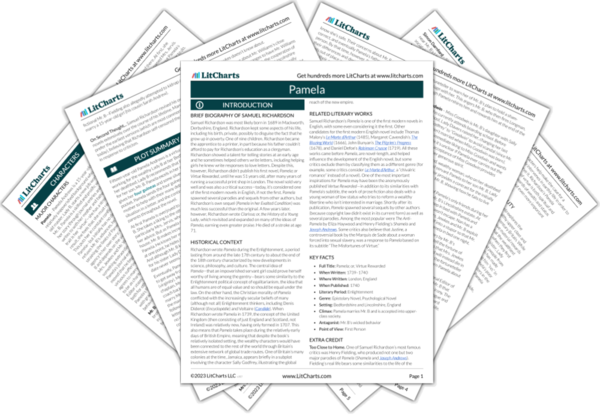Summary
Analysis
Pamela writes yet another letter to her father and mother. She tells them she remains committed to coming home soon, but Mr. B keeps insisting that she’ll stay another two weeks. He offered her 50 guineas and promised to pay her father that every year, but she still refused. After that, Mr. B suggested finding another husband for Pamela, such as his chaplain, Mr. Williams. But Mr. B kissed Pamela soon afterward, causing her to flee again.
Mr. B doesn’t understand why Pamela keeps resisting him, and he seems to think he can eventually in her over by offering more money. Four guineas isn't a lot of money for him to part with, and even 50 guineas is a relatively small sum for him, even though it would be a life-changing sum for Pamela. His attempt to kiss Pamela again right after his offer confirms how little he has learned so far.
Themes
Quiz
Test Yourself
Pamela writes that she got away from Mr. B by saying she needed an hour to consider the proposal about Mr. Williams. When Pamela was alone, she wrote a note to Mr. B saying that, even if she did want to consider Mr. Williams as a potential husband, she would need to go home to speak to her father first. After receiving the note, he sent Mrs. Jervis to tell Pamela he won’t oppose her leaving, along with a gift of five guineas.
It seems clear that Mr. B’s scheme to get Pamela to marry Mr. Williams isn’t real, and yet because of her lower status, Pamela still has to act as if it is real. Because Pamela can’t get through to Mr. B in person, she tries to write to him instead, perhaps knowing that writing well is one of her strengths.
Themes
Quiz
Test Yourself
In the post-script to her letter, Pamela writes a poem about leaving her position at the house. The poem is about how she used to be happy there but has to leave out of fear of being tempted there.
Pamela’s poem confirms that in spite of her supposedly lower status, she is intelligent and capable of creativity. The poem marks the end of one phase of her story, although the next phase won’t be what Pamela expects.
Themes
Literary Devices
Quiz
Test Yourself
A new narrator (the Editor) speaks directly to the reader about Pamela’s story and how her worst challenges are yet to come. The Editor reveals that Mr. B is actually sending Pamela to his estate at Lincolnshire, not back home. In fact, John was working with Mr. B and always let Mr. B read Pamela’s letters first and that he’s even stopped three of them from going out. Now, Mr. B writes a letter to Pamela’s father, trying to convince him that Pamela is having an affair with Mr. Williams.
While the novel mostly strives for realism by limiting the action to things Pamela could have conceivably witnessed and written about, the introduction of the Editor allows for the story to incorporate some elements that Pamela couldn’t possibly know about yet. This passage creates tension with dramatic irony, a literary technique in which the audience’s knowledge about a story surpasses that of the story’s characters. Here, while Pamela thinks she’s headed home, the audience knows that she’s actually headed to Lincolnshire.
Themes
Literary Devices
Quiz
Test Yourself
Get the entire Pamela LitChart as a printable PDF.

The letter from Mr. B disturbs Pamela’s father, even though he remains convinced of Pamela’s innocence. Her father goes to see Mr. B himself. When he gets there, Mr. B lies and says that he sent Pamela to London to help serve a bishop’s family. While Pamela’s father goes away, Mrs. Jervis and some of the other servants are appalled to hear that Mr. B tricked Pamela. Pamela herself manages to get them a short letter where she confirms she was tricked. The Editor mentions that Pamela wrote the remainder of her story like a journal because she had free time and thought that perhaps she might want to send it to friends or look back on it.
As Mr. B places more and more restrictions on Pamela, it makes sense that she would not be able to write letters as freely as she did previously. While letters are still an important part of the remainder of the story, the transition to a more journal-like structure helps convey how Mr. B’s attempts to restrict Pamela increasingly isolate her from the outside world.
Themes
Quiz
Test Yourself












